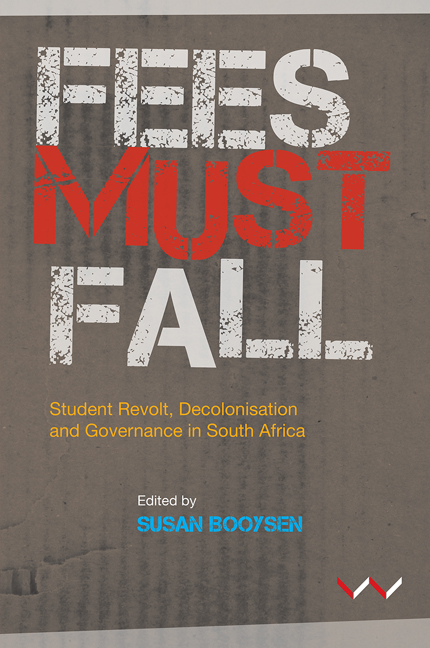Book contents
- Frontmatter
- Contents
- Acknowledgements
- Preface
- Introduction
- PART ONE POWER REDEFINED – ‘WHAT HAPPENED TO GOVERNANCE?’
- PART TWO PRIMARY VOICES – ‘THE ROOTS OF THE REVOLUTION’
- Chapter 2 The roots of the revolution
- Chapter 3 The game's the same: ‘MustFall’ moves to Euro-America
- Chapter 4 #OutsourcingMustFall through the eyes of workers
- Chapter 5 Documenting the revolution
- PART THREE THE REVOLT – ‘RISING AGAINST THE LIBERATORS’, SOUTH AFRICA IN AFRICA
- PART FOUR POWER AND CLASS REDEFINED – ‘SIT DOWN AND LISTEN TO US’
- PART FIVE JUSTICE, IDENTITY, FORCE AND RIGHTS – ‘WE CAME FOR THE REFUND’
- APPENDICES
- Contributors
- Index
Chapter 2 - The roots of the revolution
from PART TWO - PRIMARY VOICES – ‘THE ROOTS OF THE REVOLUTION’
Published online by Cambridge University Press: 20 April 2018
- Frontmatter
- Contents
- Acknowledgements
- Preface
- Introduction
- PART ONE POWER REDEFINED – ‘WHAT HAPPENED TO GOVERNANCE?’
- PART TWO PRIMARY VOICES – ‘THE ROOTS OF THE REVOLUTION’
- Chapter 2 The roots of the revolution
- Chapter 3 The game's the same: ‘MustFall’ moves to Euro-America
- Chapter 4 #OutsourcingMustFall through the eyes of workers
- Chapter 5 Documenting the revolution
- PART THREE THE REVOLT – ‘RISING AGAINST THE LIBERATORS’, SOUTH AFRICA IN AFRICA
- PART FOUR POWER AND CLASS REDEFINED – ‘SIT DOWN AND LISTEN TO US’
- PART FIVE JUSTICE, IDENTITY, FORCE AND RIGHTS – ‘WE CAME FOR THE REFUND’
- APPENDICES
- Contributors
- Index
Summary
INTRODUCTION
This chapter discusses the roots of the 2015 and ongoing protests in South Africa across three areas. The first area is that of the views, beliefs and experiences of current students. The voice here is chiefly that of Rekgotsofetse Chikane, who was centrally involved in the Fallist movement. Chikane's primary voice brings a particular insight into the philosophies that shaped and grew out of the protests at the University of Cape Town (UCT) and elsewhere. The other two areas are the social and political roots of the protests, and those roots as found in South African university management practices.
STUDENT ROOTS
In public discussions, the Fallist movement and the academic project are often presented as incompatible. This chapter argues that decolonisation is the necessary road towards inclusive academic excellence. Pro-democracy and anti-fee protests worldwide have located themselves within the discourse about the role and purpose of a university for students and society. Across the globe, students are re-imagining the functioning of a university. They are rejecting the dominant ideologies of managerialism, neoliberalism and commodification within universities (Gonzalez 2012).
The South African protests of 2015 were driven by the same process of radical re-imagining. Set within the rapidly changing context of race, class, gender and various intersectional relations on campus, the protests were one facet of a new discussion regarding the role of South African universities in the development of their students. Malia Bouattia (2015: 26), describing the need for radical action to decolonise higher education in the United Kingdom, writes that as ‘… minor reforms are not working, we require alternatives to structures which mainly benefit straight white middle-class men’. The students in South Africa similarly require, not minor reforms of their institutions, but revolutionary change.
Noor Nieftagodien, chair of the History Workshop and active member of the October 6 movement at the University of the Witwatersrand, explains that this protest is not just about incorporating more black students into the status quo. It is about deep change within the university (Noor Nieftagodien, personal communication, 10 November 2015).
Information
- Type
- Chapter
- Information
- Fees Must FallStudent revolt, decolonisation and governance in South Africa, pp. 54 - 73Publisher: Wits University PressPrint publication year: 2016
